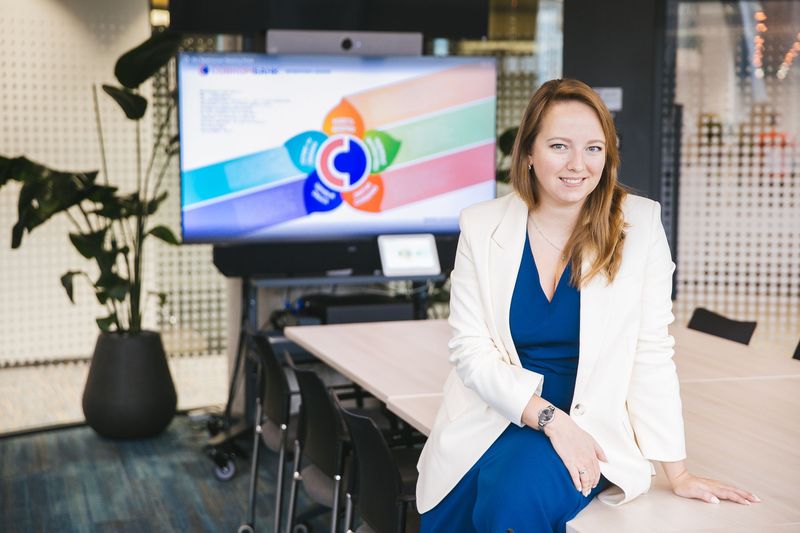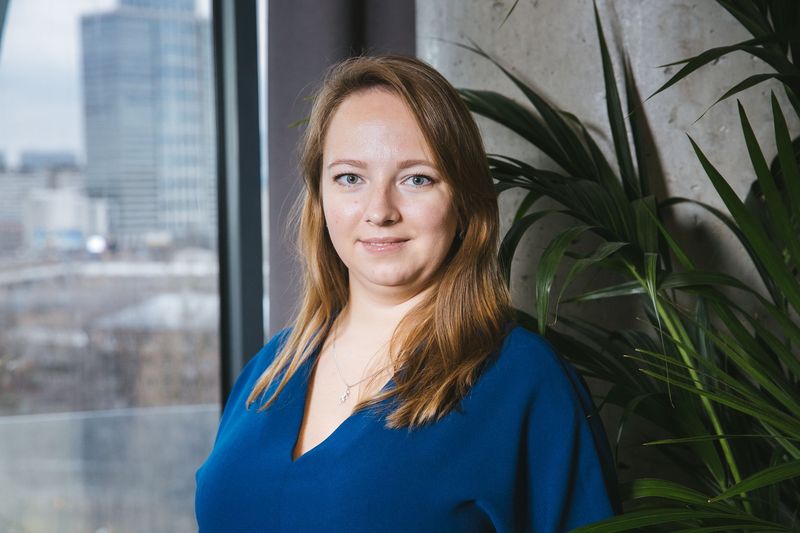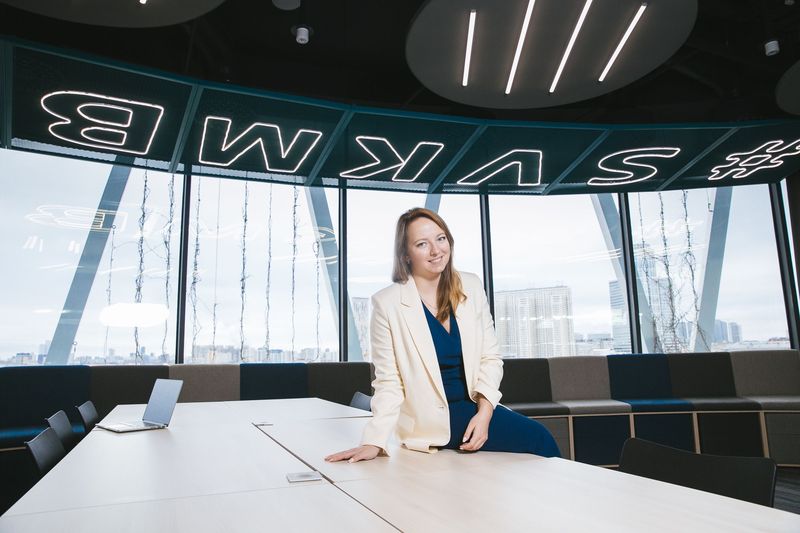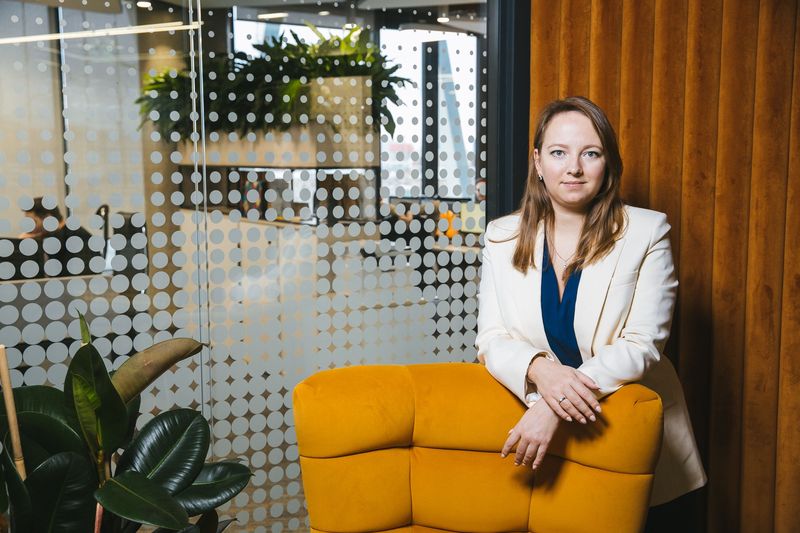“I Took On the Task of Cultivating Skills in Students and Pursue It as My Second Calling"

Maria Petrova, who did her bachelor’s at HSE Perm and her master’s at HSE ICEF, heads a department at Sovcombank. Maria co-authors a master’s-level course designed to help the students of NES and ICEF become better prepared for the workplace and even land job offers before graduation. In this interview with Success Builder, Maria tells about the qualities employers look for in the candidates for analyst position, how new hires can improve their managerial skills, and why Sovcombank chose to be its own source of manpower.
Why did you choose to study economics?
While a school student, I developed a passion for mathematics and exact sciences. So for me, economics, as a domain which embraces also sciences, seemed a perfect choice. I remember how our teacher once took us on a tour of a steel works for us to see the production process in action, and I caught myself thinking engineering wouldn’t be the right career for me. Nor would engineering mathematics. It seemed more of a boys’ choice, with little connection with the real world. So, I turned my eyes to Finance as a more attractive field where I’d be able to apply my skills and knowledge.
My folks said economists were plentier than plenty, but I hoped I’d be able to beat the competition. I grew up in Perm Territory, and it was shortly before I graduated high school that HSE started its campus there. Its reputation was that of a daring school, with impressive marketing campaign and superb environment for learning English – this latter point stood in my favour, I had good English language skills. Besides, HSE grads were known to excel in careers from business to science. All this made HSE a perfect place to be. To say I had an amazing experience here would be an understatement – I made lifelong connections, I was a part of an English-speaking community, I had some of the strongest teachers, and I could feel that inspiration that sets HSE apart from all other universities.
About Maria:
She earned her bachelor’s in Economics from HSE Perm in 2012 and her master’s from HSE ICEF in 2014. While a master’s student, Maria served as an assistant at the Laboratory of Financial Economics (ICEF). In 2013, Maria interned with KPMG and later joined VTB as an analyst (2013-2016). Maria’s career at Sovcombank, where she currently heads Financial Markets Analysis Department, began in 2016. In 2020 Maria started lecturing at NES and was collaborating with MGIMO in 2021. In 2023, Maria co-authored the master’s-level course Investment Analysis which is currently taught at ICEF and NES.
Those were the four wonderful years. As a bachelor’s student, because I had been to a few conferences hosted in the Moscow-based campus, I became quite familiar with HSE Moscow. New opportunities weren’t hard to spot, and I thought why not do a master’s in Moscow. I’d already had some work experience in finance, so that master’s was a way for me to learn more and increase my professional value for employers.
But why did you think your master’s would lead to that purpose?
It promised better career awareness and a broader perspective. As a bachelor’s student, you spend your first couple of years getting the feel of Economics as a career field, and it isn’t until your final year that you start to see how and where to put your skills and knowledge to work. You do internships, you communicate with graduates – this increases your awareness. In my case, I knew for sure I didn’t want to be an accountant or a corporate economist preparing budgets in Excel. I was lucky to have Professor Igor Zakharov as a supervisor for my 3rd-year coursework. Prof. Zakharov taught econometrics to master’s students and had an excellent way of debriefing the complexity of the financial markets, which I found very interesting to follow, so I dared to ask him to be my supervisor. He looked at me as if I weren’t serious, but gave a list of books to read as preparation.
Little did I know that my paper would turn out to be a year of hard work. My topic dealt with stock markets and securities, and it required me to be experienced with complex modeling. But it wasn’t without pleasure that I ploughed through those heaps of books. In the end, my supervisor recommended me for the analyst internship position in a company that specialized in stock markets.
While other students’ internships sounded like mere paper shuffling, mine had given me some real hard job in the aftermath of the crisis of 2009
The people in that company talked financial problems of the eurozone, bankruptcies, Greece going into default, US national debt – for me they were like a window into the world. After that internship, I knew exactly what I needed to learn next. My plan was to choose a degree and move to Moscow, where career opportunities looked definitely brighter. There was so much more to be explored that went beyond the scope of my bachelor’s degree.
I familiarized myself with all the master’s programmes available in Moscow in my field to discover that the ICEF’s one was, objectively, the only master’s with advanced instruction, reputable diploma, and double-degree track with study-abroad opportunities. Another thing I liked about ICEF was its internationally recruited faculty and English as the language of instruction, which meant easier integration into the global industry while a student. ICEF’s MSc Financial Economics sounded a perfect fit, so I didn’t apply anywhere else.
Was it difficult for you as a former student of HSE Perm to adjust to HSE Moscow?
HSE campuses share a unique atmosphere. I knew what to expect because I was familiar with the teaching approach, standards, and university ethics from before. The teacher-student interaction is highly productive here and special. The academics have respect for the opinion of their students and are willing to provide support also outside the classroom. I value ICEF precisely for this special caring attitude. It benefits its students through freedom, culture of choice, utmost convenience of learning, and reduced bureaucracy.
But when it comes to study load and learning scopes, ICEF did prove a bit of challenge.
ICEF keeps you always on the go, energizing and giving you your second wind, which is great
I, an A student who earned her honours from HSE Perm almost effortlessly, had to work hard on mathematics and related subjects. ICEF sets high standards for its students, and studying here is not a leisurely event. My experience of doing coursework under the guidance of Professor Zakharov had proven useful. Once you’re past you first examination, this fast-paced mode will no longer be a problem, you’ll find your study load easier to cope with and that keeping up with the pace is actually about meeting deadlines.
You worked at the Laboratory of Financial Economics while an ICEF student. Was it a useful experience for you?
I served as an assistant and as such have learned how to collect and analyze the data for model-building purposes. Also, I’ve gained researcher experience and am familiar with the international standards for academic paper writing. I’d say my integration with research community at LFE has been productive. The problem-solving techniques that I learned here come in very useful when dealing with lots of information on markets and companies in my job as analyst.

Research skills are as important in finance as they are in any other field. But it should be borne in mind that in real economy, academic research and analytic studies are two different things in terms of purpose and applied value. Students need to learn to do both while they are students – by solving cases together with the industries, as a common technique.
Do banks really look at candidates’ researcher skills?
They certainly do. But the first thing banks look at is where the candidate studied. If they find the school and the degree satisfying, the resume gets studied further for activities such as research, lab assistantship, teaching, participation in competitions, conferences, academic performance, etc. At my bank, we value candidates who earned their CFA Level 1 certificates while students. For us, it is an indication they are highly motivated to achieve professional success. The more diverse the candidate’s skillset is, even if it comes from their experience in academia, not industry, the more likely they are to handle multitasking.
You started out as an analyst at VTB. Did you instantly know you were on the right career path or were you doubting it?
I began to work at VTB as an intern, and it was through tough selection. Out of a thousand candidates, the bank selects only a few dozen. The interview involves several stages, where each shortlisted candidate is interviewed by multiple departments in parallel. In my case, it was obviously my previous work experience in Perm that had played a role. I was hired to the analyst position in asset management team and was tasked with all the usual roles at first. I generally liked my job. VTB is a gigantic structure, and my biggest challenge was to get adjusted to its vastness. When you are out of the comfort of a family-like environment like ICEF’s and into a huge machine where you are a small cog, it gives you psychological discomfort. It requires time and effort to get used to endless bureaucracy and tasks like getting papers approved. This was one of the reasons why I left VTB after three and a half years for a smaller bank, where I was able to enjoy a wider range of duties and learn new things. My new job has opened up a whole new world for me.
How has Sovcombank enriched your experience in terms of job roles and opportunities?
I joined Sovcombank in 2016, when it was five times smaller than it is now, in terms of assets and structure. And I joined it at the very right moment: many of its departments were only emerging and had very few analysts. From a god-forsaken unit at VTB, I was immediately promoted to chief analyst advising to Sovcombank’s managers. I couldn’t fell more motivated.
It felt amazing to see my expertise contributing to Sovcombank’s decision-making
My interviewers at Sovcombank were its shareholders – a new, exciting experience for me. Sovcombank has grown at lightning pace, and so has my professionalism. The bank started with just two analysts when I joined it and it now has fifty, enjoying a reputation as one of the country’s largest banks. I head its team of analysts. We research commodity markets, macroeconomy of Russia and other countries, and largest global and domestic market players, looking for promising stocks, bonds, and more. It’s a highly challenging job in terms of responsibility, but an interesting one too.
What other skills and qualities, apart from hard skills, does the role of manager require?
I personally rely a lot on my innate skills. I’ve never been afraid to take on new challenges and make decisions. Nor have I ever shifted responsibility for anything. It’s me who is responsible for the result, even if it’s failing. We learn managerial skills while students and by observing our senior colleagues at work. My experience is no exception, I adopted my best practices from senior team members.
The reason I eased into my new role at Sovcombank so naturally was because there were many role models. Every day, the people in my bank were making multibillion-rouble decisions. I could hear them provide reasons and arguments, and this increased my own understanding of the economic processes.
Apart from the decision-making skills and the ability to take on responsibility, it is important for a manager to have good interpersonal skills. You need to be able to encourage you team, to inspire and support, and give tasks that lead to more effective performance. This isn’t easy. I don’t want to brag but I think I’m good at all this thanks to my communication skills and my innate capacity for empathy. But I’m still learning.
Which of your previous experiences helps best in your role as a lecturer at NES?
In 2021, when I was appointed head of Sovcombank’s credit analysis, the market was on a serious increase, with retail investment booming. At the same time, the banking sector was suffering a shortage of analysts with experience in finance. Finding an analyst for my team seemed almost impossible, for candidates had poor experience and high demands. The situation has changed a lot over the past ten years, but after the mass layoffs in 2014 the prestige of finance as a career has dropped. Things were further aggravated by many promising specialists leaving for the growing IT sector.

Then, an idea occurred to us to grow our own team of analysts. We instituted junior analyst positions and started to recruit the Economics majors. While university degrees equip students mostly with theories and academic knowledge, we offer hands-on training in economics and finance, preparing our junior analysts for their future role at Sovcombank – and this is how we have established partnerships with ICEF, MGIMO and NES. The latter offered us to teach a course to undergraduates, of which I have the honour to be teacher and co-author.
How did you like your role as a teacher?
I really like teaching and communicating with students. They are ambitious and energetic, they come up with fresh ideas and help me look at my familiar tasks from new perspectives. You think you know everything and suddenly there’s someone who bombards you with questions and triggers a discussion, an energizing experience. There aren’t many people in banks, unfortunately, who are interested in giving talks to students and sharing expertise. I am glad our bank is different in this respect. I took on the task of cultivating skills in students and I pursue it as my second calling.
Another thing I draw from teaching is personal development. I am not a bookworm type of analyst who communicates with nothing but numbers, but the one who knows how to get my message across, provide arguments and give quality to a professional discussion. During the three years of the course, we recruited eight junior analyst interns who are now an important part of our team and experienced enough to get promoted. Other divisions within Sovcombank are asking us to get them guys as good as ours. It gives me a good feeling.
Your course in Investment Analysis is now available also to ICEF students. How will it benefit them?
It’s a one-year course and it’s about banking divisions, tasks and duties of an analyst, industries, financial instruments, world of finance and much more. My part of the course deals with petroleum industry and energy sector, while that of my colleagues introduces to more industries, macroeconomies, etc. We task the students with real-life investment cases and provide them with feedback. Investment analysis is one of the key topics banking specialists need to have good awareness of, it is something that we, banking analysts, are knowledgeable about and can share the experience in.

We’ve been dealing with various financial instruments, mainly bonds and stocks, and can teach how to identify investment opportunity and act on it depending on the context of particular economy. The course is, in fact, based on Sovcombank’ unique experience. Alongside hands-on knowledge of financial markets and investment, it helps learners to approach career choice with greater awareness and therefore contributes to successful career start. Upon completion of the course, those who have shown motivation and diligence can expect job offers from Sovcombank. In any case, even if you’re not intent on joining us, you will benefit from our course by becoming a more competent investor and candidate for jobs in banking or related sectors.
Besides, those who are interested in investment industry will benefit find useful one more inspiring invention from our analyst team: Market Power. It teaches stocks and stock markets through comics, videos and Telegram channel.
How do you think the students of HSE differ from those of other universities?
Well, as a former HSE student, I have adopted values that I see being shared by the current students. I trust HSE as a source of competent specialists and versatile personalities. I know how challenging the studying at ICEF is. The students of ICEF and NES don’t study for wallpaper degree, they study for knowledge. For me, as an employer, these two schools are the yardstick for competence. The one who made through HSE knows what it means to study hard and work hard and is a good specialist. The tasks of an analyst aren’t easy, and ability to learn while gaining new experience is crucial for this job. HSE grads are driven to go above and beyond. And as we all know it, good opportunity will come along the way of those who seek it.